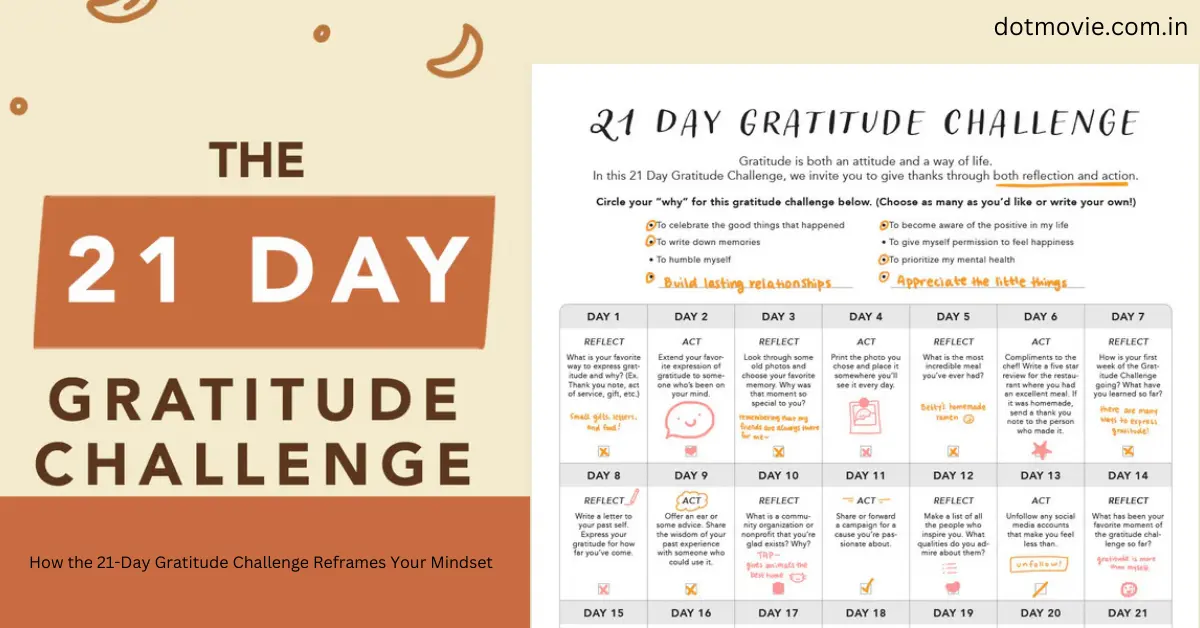
Transform Your Recovery: How the 21-Day Gratitude Challenge Reframes Your Mindset
In a world where stress and negativity often take center stage, gratitude can seem like a foreign concept. Yet, it holds the potential to transform our lives, especially for those on a recovery path. The 21-Day Gratitude Challenge is an empowering tool that reframes your mindset, making the elusive pursuit of happiness and fulfillment within reach.
Discovering the Power of Gratitude
Gratitude isn’t just about saying “thank you.” It’s a profound acknowledgment of the positive aspects of life, even amid challenges. For individuals focused on recovery, cultivating gratitude improves mental resilience and overall well-being. Research shows that practicing gratitude can reduce stress , foster positive emotions, and even improve physical health.
Why a 21-Day Challenge?
Transformative habits aren’t built overnight. The 21-Day Challenge provides a manageable timeframe to establish gratitude as a daily practice. Psychology suggests it takes approximately three weeks to form a habit, making this challenge the perfect introductory period to integrate gratitude into your routine.
Getting Started with the 21-Day Gratitude Challenge
Beginning a new practice can be daunting, but with the right approach, the 21-Day Gratitude Challenge becomes an exciting endeavor. Start by dedicating a few minutes each day to reflect on what you’re grateful for. This simple act can be done first thing in the morning or before bed, setting a positive tone for your day or evening.
Creating a Gratitude Journal
A gratitude journal serves as a tangible reminder of your positive experiences and thoughts. Each day, jot down three to five things you’re grateful for. Over time, you may notice patterns or recurring themes, reinforcing the abundance in your life. Journaling not only enhances self-awareness but also provides a sense of accomplishment when reflecting on your entries.
Daily Affirmations to Enhance Gratitude
Daily affirmations are a powerful addition to your gratitude practice. By repeating positive statements about yourself and your life, you can slowly shift your mindset from negativity to positivity. Simple affirmations such as “I am grateful for my resilience” or “Today, I choose happiness” can make a significant impact over the 21-day period.
Incorporating Mindfulness with Gratitude
Mindfulness and gratitude are a dynamic duo. Mindfulness encourages living in the present, while gratitude focuses on appreciating the moment. Together, they enhance your ability to recognize and savor the good things in life. Practice mindful listening or savoring a meal without distractions, and take note of these experiences in your gratitude journal.
Sharing Gratitude with Others
Expressing gratitude to others strengthens relationships and fosters a supportive community. Take the time to thank someone personally for their support or kindness. A heartfelt note or a simple verbal acknowledgment can brighten their day and reinforce your connection, creating a ripple effect of positivity.
Overcoming Challenges During the Challenge
Challenges are inevitable, even in a gratitude practice. Some days may feel harder than others. During these times, focus on even the smallest positives. A warm cup of coffee, a kind word from a stranger, or a beautiful sunset can serve as reminders that there is always something to be grateful for, no matter how trivial it may seem.
The Science Behind Gratitude and Recovery
Gratitude impacts the brain in profound ways. Neuroimaging studies reveal that gratitude activates areas of the brain associated with dopamine, the “feel-good” neurotransmitter. For those in recovery, this activation can reinforce healthier behavioral patterns and provide a natural boost to emotional well- being, aiding in the recovery process.
Measuring Your Progress
Tracking your progress is crucial to maintaining motivation. Reflect on your mood, energy levels, and interactions with others throughout the challenge. Notice any shifts in your outlook or responses to stress. These observations will help cement gratitude as a core component of your recovery toolkit.
Celebrating Your Gratitude Journey
At the end of the 21 days, take time to celebrate your achievements. Revisit your journal, acknowledge personal growth, and set intentions for incorporating gratitude into your long-term recovery plan. Celebrate milestones and remember that gratitude is a lifelong practice, not just a short-term challenge.
Continuing Your Gratitude Practice Beyond the Challenge
The end of the 21-Day Challenge marks the beginning of a lifelong commitment to gratitude. Continue your journaling, affirmations, and mindfulness exercises. Explore new gratitude practices, such as gratitude walks or meditation, to keep your practice fresh and engaging.
Conclusion
The 21-Day Gratitude Challenge is more than a temporary exercise; it’s a gateway to a fulfilling and positive lifestyle. By committing to this practice, you’ll likely experience a shift in mindset that supports your recovery and enhances your overall quality of life. Whether you’re at the beginning of your recovery or well into your journey, gratitude offers a path to profound personal transformation.
Ready to start your gratitude challenge? Begin today and watch as your mindset—and life—transform in extraordinary ways.
